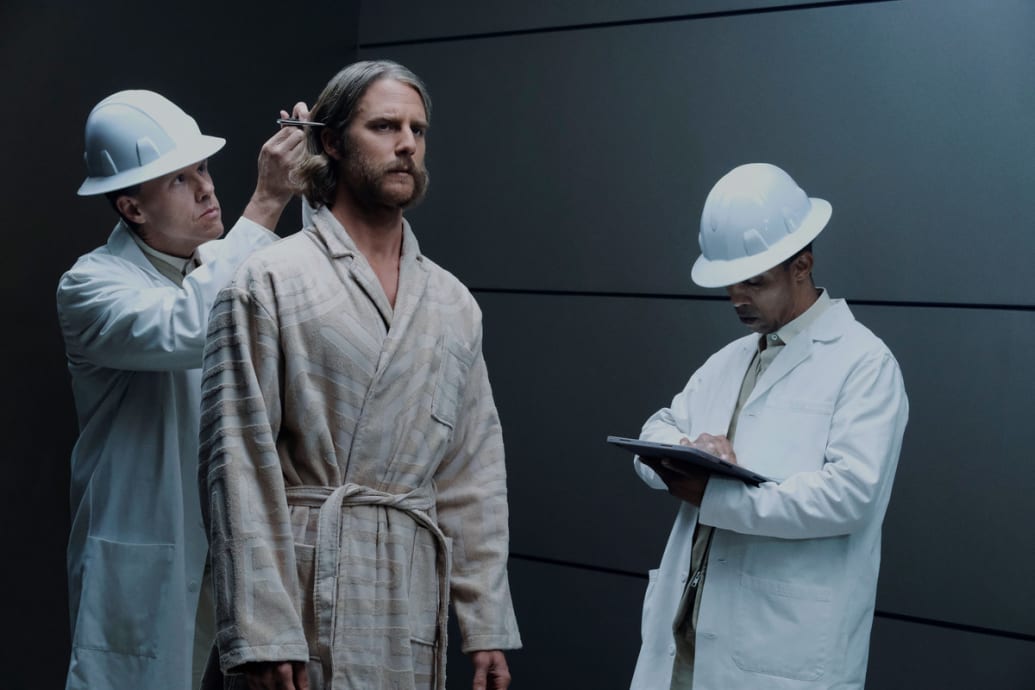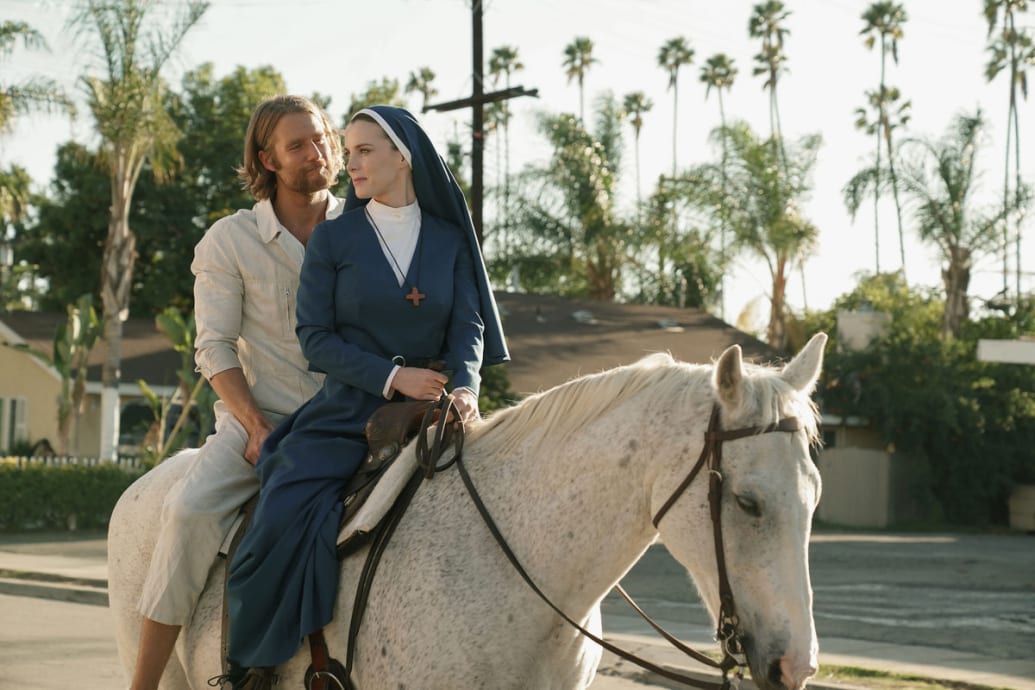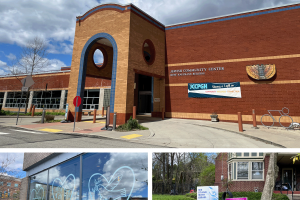To say that Jake McDorman is thrilled to have the Mrs. Davis finale out in the world is an understatement—because now he no longer has to keep the show’s bonkers plot twists to himself.
“I’m itching to talk about it,” the actor told The Daily Beast’s Obsessed. “It’s so refreshing to talk to people who have seen it so you don’t sound like an absolute lunatic to your friends and family.”
Indeed, Mrs. Davis, from writer-producers Tara Hernandez and Damon Lindelof, has taken viewers on the wildest, twistiest ride over the course of its eight episodes, all streaming now on Peacock. It’s a journey that’s taken us from 14th-century France to Reno, Nevada, to Vatican City, and to the belly of a Holy Grail-eating whale, as Simone (Betty Gilpin) and Wiley (McDorman) attempt to outsmart the omnipotent AI known as Mrs. Davis.
For McDorman—who for 20 years has graced TV screens on shows like Greek, Shameless, Limitless, and Dopesick—it presented the biggest and most fun challenge of his career thus far.
“The way that Mrs. Davis gets to be a sci-fi one day, and then a rom-com the same day, and then a fantasy novel the next—it’s really special,” the 36-year-old Texas native said. “Betty put it well [when] she said most roles require you to use 10 percent of your capacity, if you’re lucky, and this was one that really challenged everyone to use 110 percent. It really was surreal as an actor to unleash and get stupid and silly, but then realize that you can still take it as deeply dramatic as any drama on television.”
That’s especially true in the season finale for Wiley, who’d spent the previous seven episodes thinking it was up to him to save the world from Mrs. Davis, but repeatedly realizing that he’s more of a sidekick to Simone, his much more fearless ex-girlfriend turned nun. Episode 8, however, finally gives Wiley his hero moment—along with what McDorman describes as Wiley’s “ego death.”
Below, McDorman breaks down the season finale and tells us what he thinks is next for Wiley and Simone.
(Warning: Spoilers ahead for Mrs. Davis.)
We’re going to talk all about the finale, but first, I have to know: How many texts have you gotten about Wiley and JQ’s strip-down in the desert in episode seven?
[Laughing] Probably the most texts I’ve gotten about any scene from any job I’ve ever had. I had some people who asked what I ate—or what I didn’t eat. It’s hard to pick a favorite scene from this show because they’re all so bizarre and bananas, but that one with Chris [Diamantopoulos] and I… it was just so ludicrous. So absolutely absurd to be deadly serious looking him in the eye, completely naked in the desert, in front of a crew of people.Switching gears: Wiley really goes through the wringer in this final episode. It seems that his biggest fear throughout the season is that he’s a coward, or that people perceive him to be a coward. Do you think he successfully conquers that fear in the finale?
Yeah, I do. I think it’s only at the end of Episode 7 when he stops caring so much about what other people think of him and he really, truly wants to prove to himself that that’s not who he is. I think once he realizes that she [Mrs. Davis] has got the upper hand, or “it” has got the upper hand, the only thing left to do is to stop running. And as he thinks about the ultimate goal of the Resistance, as he’s proxying with the prime minister of Spain, he realizes this isn’t actually the heroic way to do it.
Like, you’re still trying to weasel out of owning up to the consequences of the decision you made. And the decision was made from a place of fear, from a place of weakness, desperately wanting people to perceive you as someone heroic, that you would go get your wings and get an expiration date. Sure, it’s unfair that Wiley got stamped with an expiration date so soon, and he can come up with all sorts of justifications for bringing the entire algorithm down, but at least part of it was because he doesn’t want to turn himself in. He’s scared.
Right. He definitely seems to have changed.
So I think the decision to free the Resistance and the members of the Resistance so they can return to their lives or pick up the pieces of their broken lives and move forward without her—you can follow the same thread of logic for him being like, I have to finally face the music now. I can’t keep running, I can’t disguise it as, “We’re the heroes, Simone’s the love interest.” I have to actually look at who I really am, and who I really am is someone who made a horrible mistake and has to fess up to it now.
It was cool to see his progression getting to that place. A couple episodes ago, you had that amazing scene where you’re repeating to yourself, “You’re a big strong boy, everybody loves you, you’re never going to die!” He goes from that to, in this episode, being so confident and brave and “ready to ride the fucking bull.”
Yeah, and [going] from that mantra—the most arrest development, boyhood, petulant mantra to recite to yourself, that everyone loves you AND you’re never going to die—to actually being like, it doesn’t fucking matter, I’m probably going to die, it’s the right thing to do… yeah, that was a really cool arc.
“Cool” is definitely the right word.
Owen [Harris], the director of Episode 8, and Tara have talked about this, that he walks into Episode 8 still with his bravado and being like, “You’re not really going to kill me.” And I was concerned that if Wiley really believed that, if he thought this was just another ploy and there was no risk of him being hurt, then it would be more of an empty gesture to turn himself in.
But we really tried to lean into like, no, this is just what happens when you’re eating a bunch of creatine with a bunch of guys who watch Fight Club too much for seven years. You carry this kind of “fuck you” energy with you. Even though I think deep down, he really is scared and really thinks this is the end.
Yeah, he does go into that situation with a lot of bravado, but by the time he gets on that roller coaster ride to death, he seems to realize he was wrong. What do you remember about reading that in the script for the first time? Did you have your own bracing-for-death moment?
Yeah, yeah, yeah. As zany and over the top as a roller coaster of euthanasia is—like so many other things we do on Mrs. Davis—I was amazed that something as crazy as that could have serious emotional stakes for Wiley and for me as an actor. It’s kind of the balancing act that the show presents from the get-go, that we have the ability to push into comedy but not go so far that it can’t then oscillate back into some high-stakes drama in this weird world that they’ve built.
So yeah, if you were just handed a scene about getting on a roller coaster of euthanasia in a bathrobe and cowboy boots you’d be like, “Who the fuck could take this seriously?!” But it’s devastating. I was proud of him and scared for him, and it’s one of those things where you’re so a product of that world at that point that the stakes, out of context, would look ridiculous, but in context, they’re mortifying.

When his roller coaster cart does come back, he’s asked to say, “I am worthy.” What was your read of that moment and the significance of Wiley being able to say those words out loud?
I don’t know if it was just how fun it was to live in this world that Tara and Damon had built around us, or what in my personal life could really hook into that, but it meant a lot. Just to have someone point-blank ask you to say out loud that you’re worthy, it almost feels like the scene in Good Will Hunting where [Sean, played by Robin Williams] has Will say, “It’s not your fault.” It felt like that. It was really moving.
And even just getting your mouth to say those words, in front of people, it was very easy to tap into that desire to say, “It’s OK, nobody’s perfect, and you’re not a bad person. And this thing that’s been hanging over your head, it’s just not worth it.” I think ever since the board meeting in Episode 3, where Grainger Hines comes in as Bo and he gives the whole spiel about doping up a bull and grabbing its balls, as weird as that is, it was mortifying for Wiley, and I don’t think he ever really did recover.
It seemed like a really profound moment.
You know, some of the conversations we had a lot were about his wardrobe. You’ve got Simone, who’s basically in a nun’s habit almost 100 percent of the show, and Wiley is constantly changing outfits. And it was fun to play with because it did feel like he’s never comfortable going inward or seeing who he is. He’s always trying on a persona: a persona with the Resistance, a persona with Celeste, and even with Simone. And still carrying his rodeo past and trying to grow that mustache.
It isn’t until the pyramid facility, that moment you’re talking about, where I think he really does shed that. Even the wardrobe in that scene where he rides up on the horse, Tara was really particular with our costume designer Susie [Coulthard] about him being in just a white jumpsuit. It’s almost like a blank canvas, like he can move forward now for the first time.
Yeah, that was such an interesting scene because you saw how earlier in the episode he refused to take off his cowboy boots, and here he is on this horse, barefoot. So it’s like, wow, this really is a new man! And I do love that moment because Wiley has always wanted to be the leading man, and he’s constantly getting dressed down by people telling him that he’s not the cool Indiana Jones he thinks he is. But in that moment, he gets to ride up on the horse and finally be the hero.
Totally! And it’s only when he had that ego death. That’s really what came out of that ego death: Everything he worked so hard for and conjured up so many outfits to be, it was finally when he put them aside and was like, “It doesn’t matter. Those things don’t matter.” And I don’t even know if he realizes it. I don’t even think he rides up on the horse like, “it happened!” Because he’s so far past it.
What do you think happens to Wiley and Simone? Do they really ride off into the sunset together? Do they finally go to Alaska?
Great question. There’s a million things… Tara and Damon were really, really, really specific about wanting to close this story in one season. But the implications of how does the world react to Mrs. Davis being shut down, I mean, I don’t even think we know for sure if it was a good or bad thing.
Because as we get deeper with it, the whole Resistance was built upon the fact that you make this devil’s bargain of getting wings but you have to expire, which means you get incinerated. Well, that doesn’t happen, so they were wrong about that. So does that mean they were wrong about having a seemingly benevolent, ubiquitous AI run the world? Is world hunger really solved? If she is a force for good and we shut her down, what is the world going to think about that?
There are a lot of open questions.
I think it’s complicated. Yes, I do think that [Wiley and Simone] are able to look at each other with a fresh pair of eyes, both having gone through something unrelated to each other that they needed to go through to find their way back together. And not necessarily back together in a relationship, just back in the same vicinity without all this baggage.
Simone was running from a lot. Wiley was running from a lot. And they came together to take down a common enemy, but I think in doing so, realized that they both have things they need to tend to that have nothing to do with each other.
Betty and I talked a lot about how that’s true with long relationships. They’ve known each other since childhood, they had a romantic relationship that shattered, and sometimes I think there’s a codependency that comes from not handling something, or evolving apart from the person. I think Wiley never got over what happened at the rodeo until the very last episode of the show. So now that he is, I don’t know.
What did you think of the Buffalo Wild Wings reveal? Because I thought it was one of the funniest twists I’d ever seen on TV.
It’s so good, right?! I have this great memory of… so Betty had to perform a scene from the eighth episode while we were shooting the first episode, with Margo Martindale, because they only had the convent location [for] a certain amount of time. Only like three scripts had been written to completion at this point, so she got a breakdown and a beat sheet of episodes four through eight so she could at least have some context on how to play this scene from the eighth episode. So she had all the answers to where the whole season was going.
All the spoilers!
And while we were on set, she pulled me aside and we literally sat—I think we laid on our bellies, like when you’re telling a ghost story—and she read top to bottom how the whole season goes. And the Buffalo Wild Wings was the one where I was like “What?! Let me read that, are you serious? Do you think this will change?” And she’s like, “I have no fucking idea!” But it’s perfect. There are so many different chat bots, with Chat GPT and Bing and all this open source AI that’s spinning off into different versions of it, but you could see one from the most unexpected place, Buffalo Wild Wings. Also, good on Buffalo Wild Wings, letting us make them the architects of this evil algorithm.
I hope you get to eat there for free from now on, because they’ve gotta love this exposure.
We did have a Buffalo Wild Wings catering truck for our last episode. It was delicious.
This interview has been edited and condensed for style and clarity.






